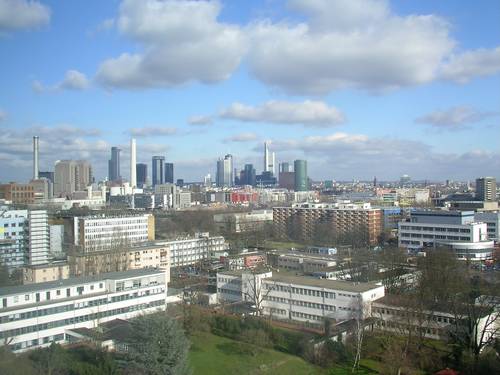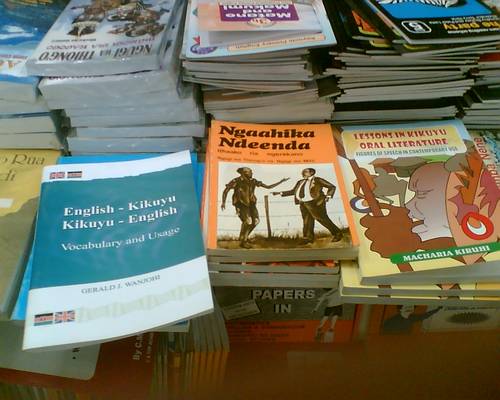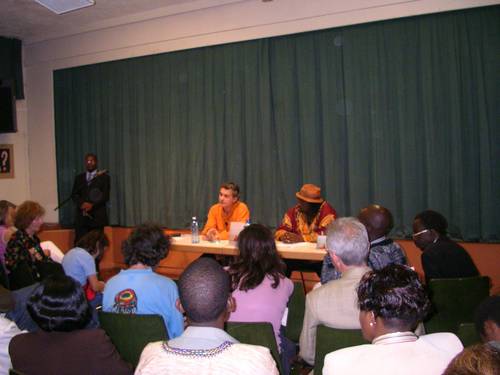“Frauen gelten hier nicht so viel, Carola….die kommen direkt nach den Ziegen.” (Quelle )
Also jetzt von oben oder von unten aus betrachtet?
“Frauen gelten hier nicht so viel, Carola….die kommen direkt nach den Ziegen.” (Quelle )
Also jetzt von oben oder von unten aus betrachtet?
Bridging the gap between the things you do, and those you only think about. Bridging the gap between the stuff you write, and the stuff you would like to write about more often.
„So what makes you special, why should I employ you and not someone else from Kenya? Why shouldn’t I employ a graduate from Kenyatta University with a Master degree, pay him around 4000,- EUR and maybe get the same results?“, the lady asked me on that job interview.
She had been to Kenya before, and knows the country to some extent. She’s in charge of a huge programme, and remains focused on the basic needs. A good, diligent worker who achieved a lot during her career. I respect her.
„Because I speak German“, I replied, „and because I don’t feel bad about the simpler work that has to be done sometimes. And because I’ll instantly fix your computer problems and get your team into operation….”
There’s no logical argument why I should be employed instead of a local person unless my marks are better. But they are not.
I also explained her that my German Abitur (A-Levels) back then was achieved under different circumstances, and that I really worked my ass off to get this stupid paper. Same as with these studies – I’ve seen so many people who really delivered good theoretical work, but didn’t know anything about practical stuff. Pls, don’t get me wrong – I don’t want blame anyone for my situation – but since those guys and gals set the standards, it also explains why we so often find assimilated workers in office jobs. People who just play by the rules and have learned to stick to their Terms of Reference only. People who never risk their job for what they believe in. Either because they are cowards, or because they need the job to pay for their families, etc.
Life, it seems, is about bridging the gap between such insanities and remaining focused on yourself.
And then, when I left the premises, I remembered my Kenyan friends telling me how much more Kenyan I am compared to them. Well, when it comes to work permits and payments, I am reduced to my passport and my marks. It is a fair system, which still ignores a lot of practical experiences. Should I have told her that I am “so Kenyan”? :-)
But then: many others depend on such a job, because they can’t do anything else. I don’t. I will make it to Kenya, with or without these companies. But going to Kenya isn’t my dream.

“a room with a view” a.k.a. the beautiful skyline @ Frankfurt am Main as of Feb 15th 2007….there is some love-hate-relationship i am having with this city. strange.
„There are four obstacles on your way to fulfill the dream of your life“, Paulo Coehlo wrote in the preface to „The Alchimist“. The first one is that still as a child, we’re told that our dreams will never become reality. The older we become, the more we try to hide it. We’ve accepted it being a dream, and remaining as such.
And then there is love. „We mistake the love“, he writes, „as an obstacle, but instead it is an additional motivation, and those who really love us, will come along“.
The third obstacle is the fear of the numerous defeats we may encounter on our way to happiness. Often, we seem to be afraid of those failures.
The fourth obstacle, he continues explaining, is about the fear of seeing our dream come true. After all those years of fighting and struggling to make the dream come true, people tend to relinquish, to give it up because they are afraid to also lose their motivation which made them go for that dream.
This small book was given to me by a dear friend, because she wanted to share this little source of wisdom with me. It’s a nice book, but then – I stopped reading it at the most exciting part because something bugged me. Something I couldn’t relate to.
The author talks about dreams and people who often miss their way to happiness and fulfilling their dreams. Only – I don’t have a dream.
I am happy with myself, I am strong and I know that I shouldn’t worry about my future because there will always be a way out of miserable situations. And as a consequence of this, there’s no dream I urgently want to fulfil. Small things maybe, small things here and there, some materialistic, some concerning my studies and some also concerning mapenzi-issues. But still, THE dream (the one and only) isn’t there.
It irritated me. Instead of a wise author trying to tell his readers a nice little story, I was waiting for that advice on how to make deciscions. I am having problems to decide. Particularly here in Europe where the choices are so many. For instance, shopping is a problem. In Kenya the range of available products is often limited (and I don’t need more), so the actual process of deciding upon certain things is much easier. I like that. Keeping it simple. But life isn’t about shopping items you may return if you don’t like them.
Life is about making decisions all the time. Decisions that indicate the difference between childhood and being an adult. But how do you know that your decision was the best?
You can’t know that in advance. So I just applied for another internship (with that above mentioned company!) which should pave my way back to Kenya. I think I will never know the truth if I remain being afraid of making the right decisions. After all, I should be glad about all those different chances I am having right now (good background, broad education, no flat/home/rent, no car, limited obligations – all those things that push most of the sad faces I see in the morning hours out of bed because they have to earn a living and keep on dreaming).
I am trying to bridge the gap between a student’s life, and setting up the framework for a secured future. Also, I am very curious to see where I am in, let’s say: 10 years time from now? Because right now, I am open to everything. And that’s my little precious treasure. Real freedom (uhuru).
Cheers!
Now what’s this? My dad isn’t even buried yet, and another man I really valued died earlier this week: polish author Ryszard Kapuscinski, famous for his travel stories from the 1960s Africa among many other interesting books. He was one of those authors where you just wish the book never ends. My most favourite book is his “The Shadow of the Sun“, which I usually recommend to most of my Mal d’Afrique-infected friends.
Also, he is one of those interesting personalities out there that show how much Poland is part of Europe, and has always been.
Rest in peace, Ryszard, and thanks for all the good stories.
1. US-$ 320 million. Now THAT’S a lot of money.
2. I really miss my guitar(s) as mentioned earlier. Something that will sweeten up lonely evenings in Embu and/or make me play along to the One Man Guitar show next door which happens to entertain me every single evening. Btw, what do you call these big (kikuyu) country hats anyways?
On my way to work, I stopped by Nairobi’s oldest music shop Assanands on Moi Avenue and asked for cheap guitars. There are these pictured below which sell for about Ksh. 4.550 /= and are actually made somewhere in Western Kenya. The finish isn’t that nice, but they work and, again, they are MADE IN KENYA. Holadiho!

…and then of course there are some Made in China which sell for slightly more, around Ksh. 5.000/= and have a much better finish:

Now let me think about this investment.
3. Next door to Asanands is the “Bookpoint” – a very nice book shop for those books you won’t find in other places of the country. I came here to look for another copy of these Kikuyu-language books I bought earlier this year. They didn’t have them. But what they have is this:

An “English-Kikuyu , Kikuyu-English” dictionary for a horrendous price (Ksh. 500/=) – but since I’d been looking for something like this for a long long time, I invested my last money (hey, I am only left with the Matatu fare back home!) to get a copy. Now this is something I shall copy for Kui! :-)
Says the author, Gerald J. Wanjohi: “(…)..Here in Kenya we know that rural children quite often outdo their urban counterparts at the national exams. The latter have very little knowledge, if any, of indigenous African languages…..(…)….The aim of this small book is to help Gikuyu-speaking people love and learn their language along with their traditions.”
Mageria no mo mahota. (~ trying is succeeding)
Anyone remembers Binyavanga’s comment on “Nairobi people living in two different worlds?”. It is so true. Again and again.
There was this public reading (organized by the German Cultural Centre (Goethe-Institut) & the German Department @ University of Nairobi) by Ilija Trojanow and Binyavanga Wainaina at the Goethe Auditorium (@ Maendeleo ya Wanawake House – used to be one of Nairobi’s tallest buildings in the 1970s!) on Thursday evening. They jointly read passages in German and English from a new book by Ilija Trojanow about Sir Richard Francis Burton, a “Mecca pilgrim and world traveller” (btw, Burton also introduced the first edition/translation of the Indian Kamasutra books to the UK among other stories). Ilija wrote a biographical novel aptly titled “Der Weltensammler” (The Collector of Worlds) on R.F.Burton – a man who was just as mysterious and sort of multicultural cosmopolitan as the author himself. Someone who kept track of his Wanderlust and never really stuck to a place. But whereas Burton’s wife eventually burned all his diaries, Trojanow has been an active publisher and promoter of books. I like Ilija’s picturesque style of describing situations, and how he manages to combine all these different worlds under one roof by using different characters / perspectives in his book.
I had read about this event in the Daily Nation on Tuesday and instantly knew it would be a perfect chance to meet some old friends at the GI. Ilija used to be a student @ the German School in Nairobi way back in the 1970s/80s and has since then often returned to the country. He’s a third culture kid like most of us out here in the blogosphere (all Nairobians are to some extent, ama?) and seems to have an understanding of the culture in the colonial East Africa and how to describe it in his book through the eyes of Burton. An interesting story.
I think it is against this background that made him write a novel on such a controversial character Burton was. And of course the Arab + East African connection: Trojanow recently accepted (not: converted to!) the Islam as his religion because parts of his family already share that believe (and for other, much more intimate reasons which he disclosed in other interviews online. Reasons that make me understand this rather unusual, but very motivated move) . Burton disguised as a Muslim pilger in order to go on a pilgrimage to Mecca (he even received a circumcision to fully prepare for the pilgrimage!) – something Trojanow also achieved (~ getting a visa for Saudi Arabia) by living with the Deobandi in India for some time.

Binyavanga and Ilija are two very different characters who – in my opinion – have come around and have an understanding for the cosmopolitan context (both lived in SA, btw). An ability which is needed to describe situations – I guess you have to be some sort of collector to aggregate impressions/worlds and imagine them in your head before you can put them down in words. After all, it’s just not the beauty of the language that attracts people to read, but the way these worlds are combined / arranged and described using appropriate words. Both authors know how to do this – and have found their readers here and elsewhere.
——————
Talking of B.Wainaina – Kwani? #4 will be out soon and hopefully available for the christmas market. All KenyanTourists (KTs) abroad should seriously think about getting their copy this time. Kwani #1,#2 & #3 have already been a success story and received with great interest by the public. Obviously, I couldn’t resist from asking both authors about a possible future cooperation, and the idea isn’t so far fetched…Kwani isn’t Wainaina’s only project – he told us about his 2nd (own) book which needs to be finished soon. Good luck!
Going to such events also includes meeting new people…new worlds…new stories. There’s this jamaa by the name of Bernhard we met tonight who came all the way from Germany to Kenya to do an internship at Kenyatta Hospital in Nairobi. Free of charge! Ok, there’s a scholarship that pays for his expenses, but nevertheless – most of you can easily imagine what it takes to work at Kenyatta Hospital. Bernhard told me that he also blogs his experiences. In any case: respect, bro!
Finally: Welcome home, Kui! (<= I would like to put a smiley here..)